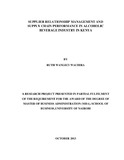| dc.contributor.author | Wachira, Ruth W | |
| dc.date.accessioned | 2013-11-13T07:48:50Z | |
| dc.date.available | 2013-11-13T07:48:50Z | |
| dc.date.issued | 2013-10 | |
| dc.identifier.citation | Degree Of Master of Business Administration (MBA) | en |
| dc.identifier.uri | http://erepository.uonbi.ac.ke:8080/xmlui/handle/123456789/58825 | |
| dc.description | A research project presented in partial fulfillment
of the requirement for the award of the Degree Of
Master of Business Administration (MBA), School Of
Business, University Of Nairobi | en |
| dc.description.abstract | Supplier Relationship Management (SRM) plays a pivotal role in reduction of costs and
increased efficiency in the supply chain function. Supplier relationship management is
the business process that provides the structure for how relationships with suppliers are
developed and maintained. Supplier relationship management has become a critical
business process as a result of: competitive pressures; the need to consider sustainability
and risk; the need to achieve cost efficiency in order to be cost competitive; and the need
to develop closer relationships with key suppliers who can provide the expertise
necessary to develop innovative new products and successfully bring them to market.
Significant benefits are possible from better managing relationships with key suppliers. It
has been shown that integration of operations with suppliers can improve firm
performance (Swink et al., 2007; Singh and Power, 2009; Flynn et al., 2010). An
additional benefit of cross functional, collaborative relationships with key suppliers is the
ability to co-create value (Enz and Lambert, 2012). The study applied a multistage
sampling technique to select the sample size 38 respondents from 38 supply chain
professionals in the alcoholic beverage companies. Questionnaires were used as the main
data collection instruments. Descriptive statistics was used aided by Statistical Package
for Social Scientists (SPSS) to analyze the quantitative data. The study utilized
descriptive and multiple regression analysis to determine the relationship between
Supplier Relationship Management and Supply Chain Performance. The objectives of the
study was to establish the extent of SRM in alcoholic beverage industry, its impact on
supply chain performance and challenges faced in implementation of SRM. This research
indicates that by adopting collaborative relationships with their suppliers contribute to
competitive advantage and value creation in Supply Chain Performance. | en |
| dc.language.iso | en | en |
| dc.publisher | University of Nairobi | en |
| dc.title | Supplier Relationship Management and Supply Chain Performance in Alcoholic Beverage Industry in Kenya | en |
| dc.type | Thesis | en |
| local.publisher | School of Business | en |

